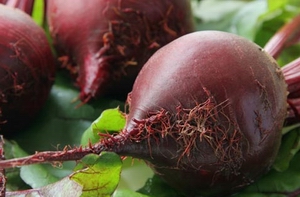 If you want to improve your athletic performance and stamina, there's no real substitute for simply putting time into working out. But if it if you're looking for a simple, natural way to increase the length of your workouts, or if you just want to give yourself that little edge in endurance or speed, then beet juice may be the answer.
If you want to improve your athletic performance and stamina, there's no real substitute for simply putting time into working out. But if it if you're looking for a simple, natural way to increase the length of your workouts, or if you just want to give yourself that little edge in endurance or speed, then beet juice may be the answer.Beet juice is naturally high in nitrate (NO3), which the body uses to make both nitrite (NO2) and nitric oxide. Nitrite is known to protect the blood vessels from injury, while nitric acid expands blood vessels and therefore increases the flow of oxygen to the cells. This, in turn, increases both the power available to the muscles and the length of time that the muscles can exercise without tiring.
Early studies into the effectiveness of beet juice for exercise showed that people who drink the juice for several days before undergoing exercise tests do indeed use less oxygen in their muscles, and are correspondingly able to exercise for longer. In one study, drinking beet juice decreased oxygen needs by 19 percent and increased exercise endurance time by 17 percent.
In other studies, scientists proved that drinking beet juice increases people's blood concentration of nitrates, and that beet juice which has had the nitrates artificially removed loses its exercise-boosting power.
Beet juice increases your speed
While early studies focused on whether beet juice can increase the time before an athlete becomes exhausted, more recent studies have focused on the juice's real-world effects on athletic performance. For example, a study published in 2011 in the journal Medicine & Science in Sports and Exercise found that cyclists who drank beet juice and then rested for 2.75 hours were able to complete a 4 km cycling task 11 seconds faster than cyclists who had consumed a nitrate-depleted beet juice placebo. The experimental group also completed a 16.1 km task 45 seconds faster than the control group.
More recently, researchers from Maastricht University Medical Centre in the Netherlands conducted a pair of beet juice studies, both published in the International Journal of Sport Nutrition and Exercise Metabolism in 2012. In the first, the researchers had 12 male cyclists with an average age of 31 drink 140 mL per day of either normal beet juice or a nitrate-depleted placebo for six days. The men then participated in a 60-minute cycling exercise and a 10 km timed cycling trial. After a 14-day washout period, participants were given the other beverage and the trial was repeated.
As expected, the researchers found that cyclists performed better following the nitrate-rich beet juice treatment in both time and power output.
In the second study, cyclists drank the beet juice just 2.5 hours prior to performing the cycling trial, as in the 2011 study. But this time, no difference was seen in performance between the nitrate-rich and nitrate-depleted groups. Further research will be needed to explain this discrepancy, said study author Naomi Cermak.
"We don't know whether dietary nitrate is effective only at certain exercise intensities or certain exercise durations," Cermak said.
For example, Cermak noted that the two Maastricht studies differed not only in when the beet juice was provided, but also in how long the cycling trial lasted. In the first study, participants cycled for between 14 and 18 minutes (10 km), while in the second they cycled for one hour (40 to 50 km).
"Thus we do not know yet whether the ergogenic effects of dietary nitrate depend on the duration of supplementation or the actual exercise itself (i.e. higher intensity exercise, shorter duration)," she said.





